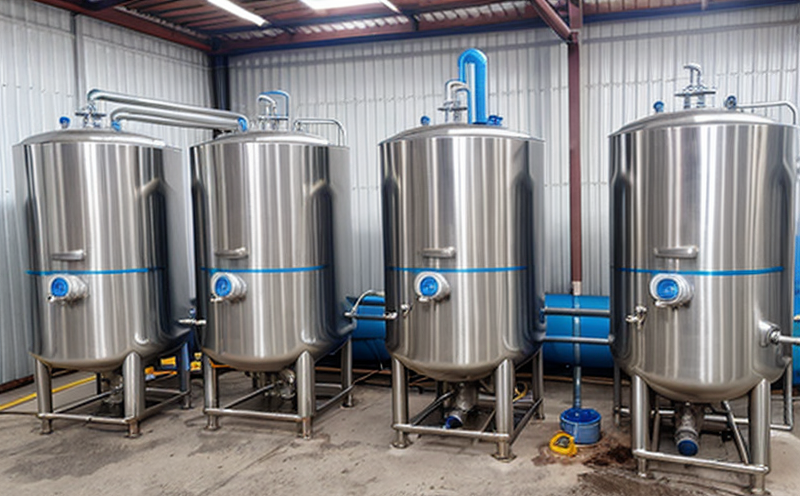ASTM D6974 Bromide Test in Boiler Water
The ASTM D6974 bromide test is a critical procedure for assessing the presence and concentration of bromide ions in boiler water. This test is essential because it helps identify potential risks associated with high concentrations of bromides that can lead to corrosion, scaling, and other operational issues within industrial boilers.
High levels of bromides can result from various sources such as seawater makeup, deionized water systems, or even the natural composition of feedwater. Understanding these factors is crucial for maintaining optimal boiler performance and ensuring compliance with regulatory standards. The ASTM D6974 test provides a robust method to monitor and control bromide levels, thereby enhancing safety and operational efficiency.
The procedure outlined in ASTM D6974 involves several key steps:
- Sample collection: Properly collect samples from the boiler water system using appropriate sampling equipment.
- Preparation: Prepare the sample according to standardized procedures to ensure accurate measurement of bromide ions.
- Measurement: Utilize a spectrophotometric method or ion chromatography for quantification of bromide concentrations.
- Interpretation: Interpret results against specified acceptance criteria to determine if corrective actions are necessary.
The importance of this test cannot be overstated, especially in sectors where water quality directly impacts the integrity and longevity of critical equipment. By regularly performing ASTM D6974 tests, facilities can preemptively address potential issues, ensuring compliance with industry best practices and minimizing downtime due to operational failures.
Scope and Methodology
| Parameter | Description | Standard Method |
|---|---|---|
| Bromide Ion Concentration | Measurement of bromide ions in boiler water to ensure compliance with specified limits. | ASTM D6974-18 (Reapproved 2023) |
| Sampling Frequency | Daily sampling is recommended for continuous monitoring, but frequency can vary based on facility needs and operational conditions. | As per ASTM D6974 specifications |
| Sample Volume | A minimum of 50 mL per sample is required to ensure accurate results. | ASTM D6974-18 (Reapproved 2023) |
| Instrumentation | Spectrophotometer or ion chromatography for precise quantification of bromide ions. | ASTM D6974-18 (Reapproved 2023) |
The ASTM D6974 standard provides detailed instructions on sample collection, preparation, and analysis. It emphasizes the importance of using proper sampling techniques to avoid contamination or degradation of the sample. Additionally, it outlines specific procedures for preparing samples, including dilution if necessary, before measuring bromide ion concentration.
Interpretation of results is based on predefined acceptance criteria set forth in ASTM D6974-18 (Reapproved 2023). Facilities are advised to establish their own limits based on operational requirements and local regulations. Regular monitoring ensures timely detection of any deviations from acceptable ranges, allowing for prompt corrective actions.
International Acceptance and Recognition
The ASTM D6974 bromide test is widely recognized and accepted across various industries. Its international acceptance is underscored by its inclusion in numerous national standards and guidelines. For instance, the European Standard EN 15803:2019 integrates ASTM D6974 as a key component for monitoring water quality parameters in industrial boilers.
Many countries have adopted ASTM D6974 as part of their regulatory framework to ensure consistent and reliable testing methods. This global recognition highlights the standard's reliability and effectiveness, making it a preferred choice among professionals involved in boiler management and maintenance worldwide.
The widespread adoption of ASTM D6974 also reflects its alignment with international best practices for water quality management. By adhering to this standard, facilities can ensure that their testing methods are consistent with global standards, facilitating interoperability and comparability across different regions.
Competitive Advantage and Market Impact
The implementation of ASTM D6974 bromide tests offers significant competitive advantages in the water & wastewater testing sector. Facilities that consistently perform these tests demonstrate their commitment to quality, safety, and compliance, which can enhance their reputation among clients and stakeholders.
By leveraging this standard, companies can differentiate themselves by providing accurate and reliable test results that meet or exceed industry expectations. This not only fosters trust but also helps in maintaining a positive market image, attracting new business opportunities and retaining existing customers.
The ability to comply with ASTM D6974 standards is particularly valuable for organizations operating internationally, as it ensures consistency across diverse markets. This uniformity simplifies compliance efforts and reduces the risk of non-compliance issues, thereby minimizing potential disruptions to operations.
In conclusion, embracing ASTM D6974 bromide testing aligns with broader trends towards sustainable and efficient water management practices. It positions facilities at the forefront of industry advancements, ensuring they remain competitive in an increasingly regulated and environmentally conscious market.





